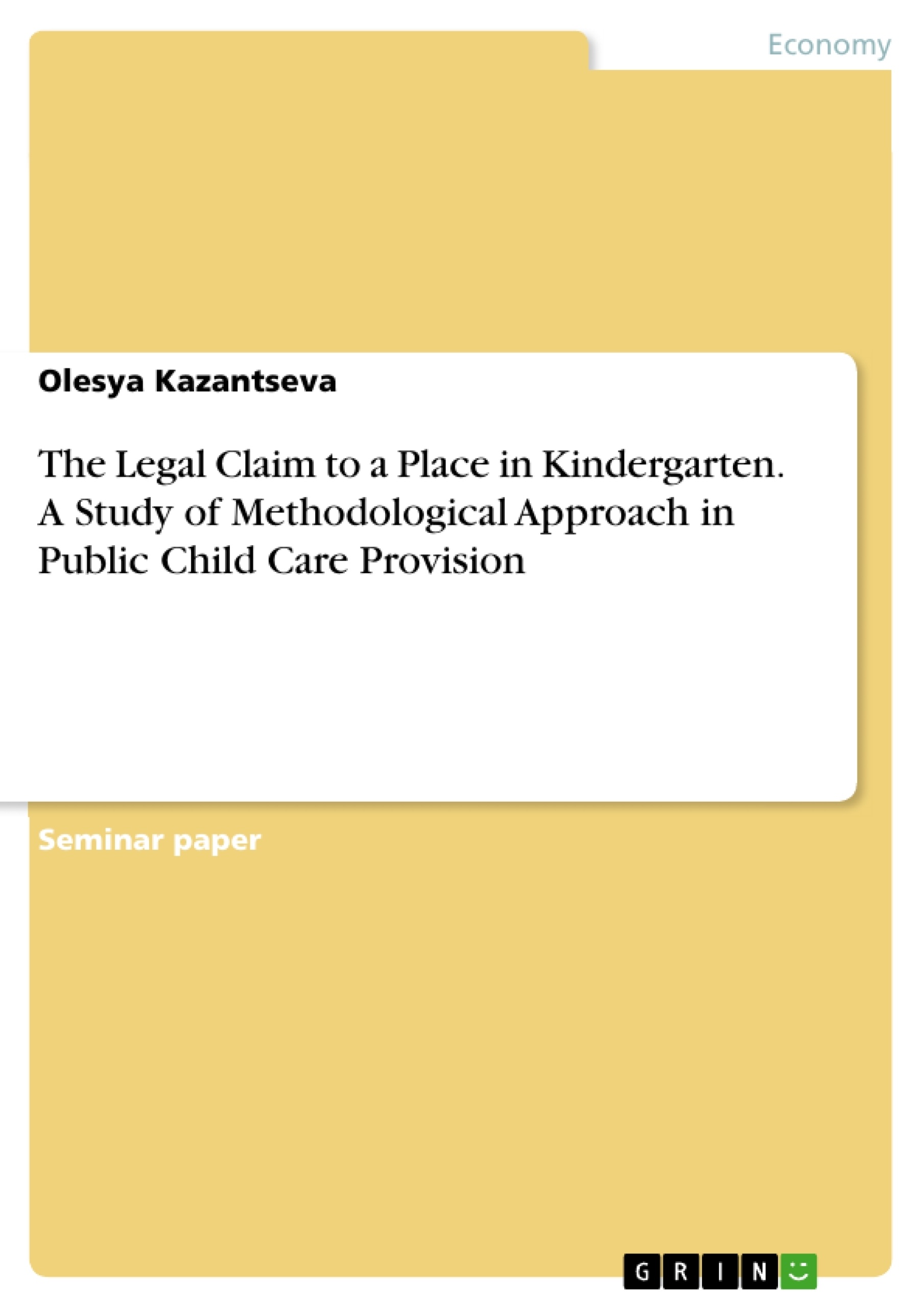The relevance of public child care provision has been an important issue in many countries for decades. Since many women with young children want to participate in the labor market, it is indispensable to have institutional provision for pre-school aged children. In order to increase public child care coverage in Germany, the state introduced a legal claim to a place in kindergarten, which became effective in 1996. The central goal of the legislation was the extension of public child care for preschool children, in order to increase female labor market participation. As reconciliation of family and working life has become a relevant political agenda in the past few years, there is a growing empirical interest to exploit the effect of subsidized public child care on maternal employment rates. However, the increasing empirical literature shows mixed results for this topic. The large part of the studies identifies clearly positive effects of public child care provision on mothers’ employment (Berlinski et al., 2011; Lefebvre/Merrigan, 2008; Schlosser, 2007). For some countries, however, the economists identify no causal relationship between subsidized child care provision and maternal labor market outcomes (Havnes/Mogstad, 2011).
Inhaltsverzeichnis (Table of Contents)
- Public Child Care Provision: The Legal Claim to a Place in Kindergarten
- Introduction
- Legal Framework for Public Child Care Provision in Germany
- The Right to Child Care
- The Legal Framework for Public Child Care Provision
- The Legal Framework for Public Child Care Provision in Germany
- Methodological Approach to the Study
- The Study Design
- Data Collection and Analysis
- Findings and Discussion
- The Legal Claim to a Place in Kindergarten
- The Implementation of the Legal Framework
- Challenges and Opportunities
- Conclusion
Zielsetzung und Themenschwerpunkte (Objectives and Key Themes)
This study aims to examine the legal claim to a place in kindergarten within the context of public child care provision in Germany. It investigates the legal framework governing access to child care services and analyzes the methodological approaches employed in evaluating the effectiveness of these provisions.
- The legal framework for public child care provision in Germany
- The right to child care and its implications for access
- Methodological approaches to evaluating child care provision
- The implementation and effectiveness of the legal framework
- Challenges and opportunities in ensuring equitable access to child care
Zusammenfassung der Kapitel (Chapter Summaries)
The introduction provides an overview of the study's objectives and research questions. It highlights the significance of public child care provision and the need to ensure equitable access to services. The second chapter delves into the legal framework governing public child care provision in Germany, examining the right to child care and the legal framework for public child care provision. The third chapter focuses on the methodological approach employed in the study, outlining the study design, data collection methods, and data analysis techniques. The fourth chapter presents the findings of the study, discussing the legal claim to a place in kindergarten, the implementation of the legal framework, and the challenges and opportunities associated with ensuring equitable access to child care.
Schlüsselwörter (Keywords)
Public child care provision, legal claim, kindergarten, Germany, methodological approach, program evaluation, access to services, equity, challenges, opportunities.
Frequently Asked Questions
When did the legal claim to a place in kindergarten become effective in Germany?
The legal claim to a place in kindergarten in Germany became effective in 1996, aiming to increase public child care coverage.
What was the primary goal of the child care legislation?
The central goal was the extension of public child care for preschool children to facilitate and increase female labor market participation.
Does subsidized child care always lead to higher maternal employment?
Empirical results are mixed. While many studies identify positive effects (e.g., Berlinski et al.), some researchers (e.g., Havnes/Mogstad) identify no causal relationship in certain countries.
What challenges exist in implementing the legal claim to child care?
The study investigates challenges regarding equitable access to services and the actual availability of places despite the legal framework.
How is the effectiveness of public child care provision evaluated?
The research focuses on methodological approaches, study designs, and data analysis techniques used to measure the impact of child care on maternal employment and family life.
- Quote paper
- Dipl.-Ling. Olesya Kazantseva (Author), 2014, The Legal Claim to a Place in Kindergarten. A Study of Methodological Approach in Public Child Care Provision, Munich, GRIN Verlag, https://www.hausarbeiten.de/document/295760


